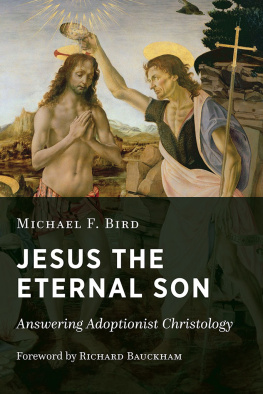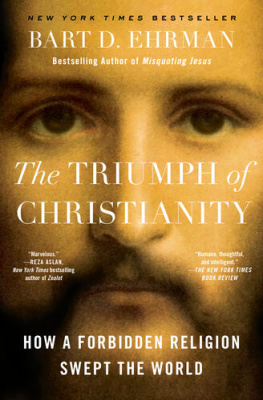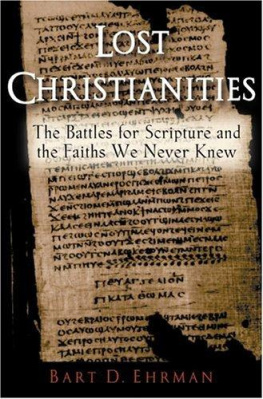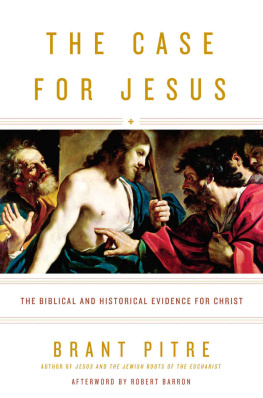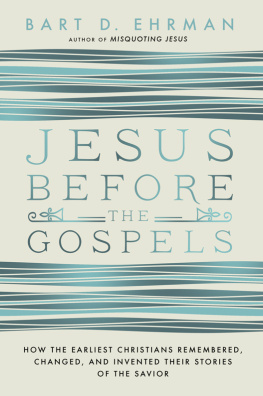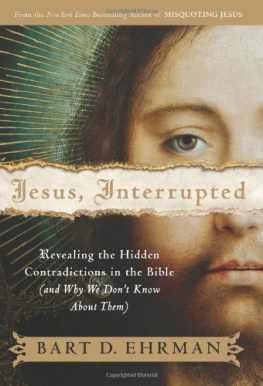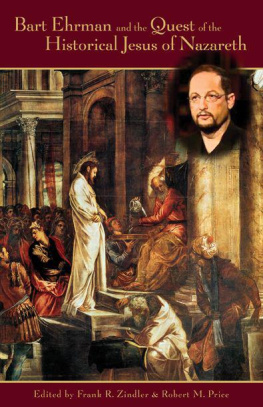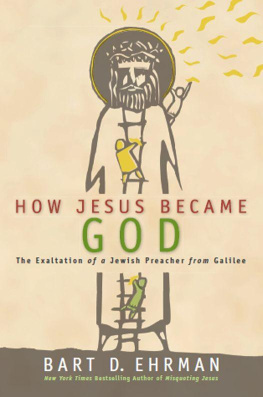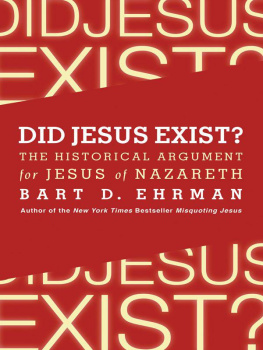
ZONDERVAN
How God Became Jesus
Copyright 2014 by Michael F. Bird, Craig A. Evans, Simon J. Gathercole, Charles E. Hill, Chris Tilling
ePub Edition February 2014: ISBN 978-0-310-51961-4
Requests for information should be addressed to:
Zondervan, 3900 Sparks Drive SE, Grand Rapids, Michigan 49546
Library of Congress Cataloging-in-Publication Data
Bird, Michael F.
How God became Jesus: the real origins of belief in Jesus divine nature a response to Bart Ehrman / Michael F. Bird, gen. ed.
p. cm.
Includes bibliographical references.
ISBN 978-0-310-51959-1
1. Subject one. 2. Subject two. I. Title.
AA000.0.A00 2004
000.00 dc23
201400000
All Scripture quotations, unless otherwise indicated, are taken from The Holy Bible, New International Version, NIV. Copyright 1973, 1978, 1984, 2011 by Biblica, Inc. Used by permission. All rights reserved worldwide.
Scripture quotations marked NRSV are taken from New Revised Standard Version of the Bible, copyright 1989, and RSV are taken from the Revised Standard Version of the Bible, copyright 1946, 1952, 1971: both by the Division of Christian Education of the National Council of Churches of Christ in the USA. Used by permission.
Any Internet addresses (websites, blogs, etc.) and telephone numbers in this book are offered as a resource. They are not intended in any way to be or imply an endorsement by Zondervan, nor does Zondervan vouch for the content of these sites and numbers for the life of this book.
All rights reserved. No part of this publication may be reproduced, stored in a retrieval system, or transmitted in any form or by any means electronic, mechanical, photocopy, recording, or any other except for brief quotations in printed reviews, without the prior permission of the publisher.
Cover design: Jeffrey Thomson
Interior design & composition: Greg Johnson/Textbook Perfect
Printed in the United States of America
14 15 16 17 18 19 20 /DCI/ 22 21 20 19 18 17 16 15 14 13 12 11 10 9 8 7 6 5 4 3 2 1
CONTENTS
Michael F. Bird, General Editor
Michael F. Bird
Michael F. Bird
Craig A. Evans
Simon Gathercole
Chris Tilling
Chris Tilling
Charles E. Hill
Charles E. Hill
Michael F. Bird, General Editor
T he purpose of this volume is to offer a critical response to Bart Ehrmans book How Jesus Became God: The Exaltation of a Jewish Preacher from Galilee. Ehrman is something of a celebrity skeptic. The media attraction is easy to understand. Ehrman has a famous deconversion story from being a fundamentalist Christian to becoming a happy agnostic. Hes a New York Times bestselling author, having written several books about the Bible, Jesus, and God with a view to debunking widely held religious beliefs as based on a mixture of bad history, deception, and myth. Hes a publicists dream since in talk shows and in live debates he knows how to stir a crowd through hefty criticism, dry wit, on the spot recall of historical facts, and rhetorical hyperbole. He also has a global audience. In fact, if I can offer a personal anecdote, on two occasions Ive received emails from Christians in the Middle East asking how to respond to local Muslims who have been reading Ehrmans writings and are quoting them at Christians as evidence that the Christian Bible has been corrupted, and that Islam is the only religion with a pure set of sacred writings. So there is more at stake here than being the resident religious skeptic on the Colbert Report much more!
As to why Ehrmans works have been so popular, well, I have my own theory. For conservative Christians, Ehrman is a bit of a bogeyman, the Prof. Moriarty of biblical studies, constantly pressing an attack on their long-held beliefs about God, Jesus, and the Bible. Conservatives buy his books if only for the purpose of keeping their disgust with him fresh and to find out what Americas favorite skeptic is up to now. For secularists, the emerging generation of nones (i.e., the growing number of people who list their religion as none even if they are not committed to either atheism or agnosticism), Ehrman is a godsend. He provides succor and solace that one need not take Jesus too seriously, confirming that religion is the opiate of the masses and that the whole God thing might be just a big mistake. In any event, Ehrman is worth addressing, since his skill as a textual critic is widely acknowledged and his showmanship as a public intellectual can hardly be denied. Such a pity then that he is almost always wrong!
In the recent book How Jesus Became God, Ehrman proffers the view that belief in Jesus divinity emerged gradually in a messy process that ebbed and flowed from exaltation to incarnation. If this were so, recognition of Jesus as God was not so much a result of divine revelation as it was a human process, a process that struggled for legitimacy even within the church. We, the contributors, do not dispute that christological development took place and the theological controversies that followed were indeed messy. We dispute, however, whether Ehrmans account and explanation for this development is historically accurate.
Not everything Ehrman says about the origins of belief in Jesus divinity is wrong. Some things are quite true, some things wed agree with but say differently, some things wed suggest need better nuance, and other things we contend are just plain out of sync with the evidence. While Ehrman offers a creative and accessible account of the origins of Jesus divinity in Christian belief, at the end of the day, we think that his overall case is about as convincing as reports of the mayor of Chicago, Rahm Emanuel, sitting in a Chick-Fil-A restaurant, wearing a Texan-style cowboy hat, while reading Donald Trumps memoire which is to say, not convincing at all. But youll have to read the rest of the book to find out why!
There are several people who need to be thanked for getting this volume out in a quick-fire fashion. First, our contributors, Craig A. Evans (Acadia Divinity College), Simon Gathercole (Cambridge University), Chuck Hill (Reformed Theological Seminary Orlando), and Chris Tilling (St. Mellitus College). These fellas did a cracking good job of writing robust and readable responses to Ehrman over the Christmas break of 2013. They worked to a deadline that was positively draconian and did not disappoint in the quality of the arguments they mustered together. Second, the editorial team at Zondervan, especially Katya Covrett, Jesse Hillman, and Verlyn Verbrugge, dropped what they were doing in the midst of the snowpocalypse of 2013 and despite office moves across town, so that we could get this book released simultaneously with Ehrmans book. I think I nearly broke them, but its turned out to be a cool project in the end. Third, Im grateful for the good folk at HarperOne for releasing Ehrmans manuscript to us well in advance of its publication.
Michael F. Bird
15th of January 2014
The Holy Birthday Feast of St. Katya of
| AsTJ | Asbury Theological Journal |
Next page

